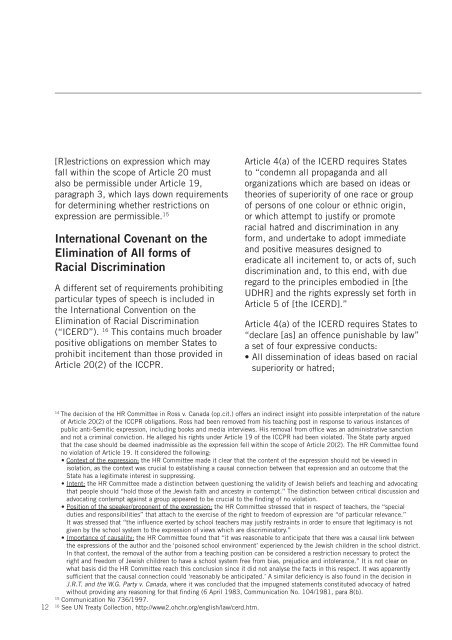ARTICLE-19-policy-on-prohibition-to-incitement
ARTICLE-19-policy-on-prohibition-to-incitement
ARTICLE-19-policy-on-prohibition-to-incitement
Create successful ePaper yourself
Turn your PDF publications into a flip-book with our unique Google optimized e-Paper software.
[R]estricti<strong>on</strong>s <strong>on</strong> expressi<strong>on</strong> which may<br />
fall within the scope of Article 20 must<br />
also be permissible under Article <str<strong>on</strong>g>19</str<strong>on</strong>g>,<br />
paragraph 3, which lays down requirements<br />
for determining whether restricti<strong>on</strong>s <strong>on</strong><br />
expressi<strong>on</strong> are permissible. 15<br />
Internati<strong>on</strong>al Covenant <strong>on</strong> the<br />
Eliminati<strong>on</strong> of All forms of<br />
Racial Discriminati<strong>on</strong><br />
A different set of requirements prohibiting<br />
particular types of speech is included in<br />
the Internati<strong>on</strong>al C<strong>on</strong>venti<strong>on</strong> <strong>on</strong> the<br />
Eliminati<strong>on</strong> of Racial Discriminati<strong>on</strong><br />
(“ICERD”). 16 This c<strong>on</strong>tains much broader<br />
positive obligati<strong>on</strong>s <strong>on</strong> member States <strong>to</strong><br />
prohibit <strong>incitement</strong> than those provided in<br />
Article 20(2) of the ICCPR.<br />
Article 4(a) of the ICERD requires States<br />
<strong>to</strong> “c<strong>on</strong>demn all propaganda and all<br />
organizati<strong>on</strong>s which are based <strong>on</strong> ideas or<br />
theories of superiority of <strong>on</strong>e race or group<br />
of pers<strong>on</strong>s of <strong>on</strong>e colour or ethnic origin,<br />
or which attempt <strong>to</strong> justify or promote<br />
racial hatred and discriminati<strong>on</strong> in any<br />
form, and undertake <strong>to</strong> adopt immediate<br />
and positive measures designed <strong>to</strong><br />
eradicate all <strong>incitement</strong> <strong>to</strong>, or acts of, such<br />
discriminati<strong>on</strong> and, <strong>to</strong> this end, with due<br />
regard <strong>to</strong> the principles embodied in [the<br />
UDHR] and the rights expressly set forth in<br />
Article 5 of [the ICERD].”<br />
Article 4(a) of the ICERD requires States <strong>to</strong><br />
“declare [as] an offence punishable by law”<br />
a set of four expressive c<strong>on</strong>ducts:<br />
• All disseminati<strong>on</strong> of ideas based <strong>on</strong> racial<br />
superiority or hatred;<br />
14<br />
The <br />
decisi<strong>on</strong> of the HR Committee in Ross v. Canada (op.cit.) offers an indirect insight in<strong>to</strong> possible interpretati<strong>on</strong> of the nature<br />
of Article 20(2) of the ICCPR obligati<strong>on</strong>s. Ross had been removed from his teaching post in resp<strong>on</strong>se <strong>to</strong> various instances of<br />
public anti-Semitic expressi<strong>on</strong>, including books and media interviews. His removal from office was an administrative sancti<strong>on</strong><br />
and not a criminal c<strong>on</strong>victi<strong>on</strong>. He alleged his rights under Article <str<strong>on</strong>g>19</str<strong>on</strong>g> of the ICCPR had been violated. The State party argued<br />
that the case should be deemed inadmissible as the expressi<strong>on</strong> fell within the scope of Article 20(2). The HR Committee found<br />
no violati<strong>on</strong> of Article <str<strong>on</strong>g>19</str<strong>on</strong>g>. It c<strong>on</strong>sidered the following:<br />
• C<strong>on</strong>text of the expressi<strong>on</strong>: the HR Committee made it clear that the c<strong>on</strong>tent of the expressi<strong>on</strong> should not be viewed in<br />
isolati<strong>on</strong>, as the c<strong>on</strong>text was crucial <strong>to</strong> establishing a causal c<strong>on</strong>necti<strong>on</strong> between that expressi<strong>on</strong> and an outcome that the<br />
State has a legitimate interest in suppressing.<br />
• Intent: the HR Committee made a distincti<strong>on</strong> between questi<strong>on</strong>ing the validity of Jewish beliefs and teaching and advocating<br />
that people should “hold those of the Jewish faith and ancestry in c<strong>on</strong>tempt.” The distincti<strong>on</strong> between critical discussi<strong>on</strong> and<br />
advocating c<strong>on</strong>tempt against a group appeared <strong>to</strong> be crucial <strong>to</strong> the finding of no violati<strong>on</strong>.<br />
• Positi<strong>on</strong> of the speaker/prop<strong>on</strong>ent of the expressi<strong>on</strong>: the HR Committee stressed that in respect of teachers, the “special<br />
duties and resp<strong>on</strong>sibilities” that attach <strong>to</strong> the exercise of the right <strong>to</strong> freedom of expressi<strong>on</strong> are “of particular relevance.”<br />
It was stressed that “the influence exerted by school teachers may justify restraints in order <strong>to</strong> ensure that legitimacy is not<br />
given by the school system <strong>to</strong> the expressi<strong>on</strong> of views which are discrimina<strong>to</strong>ry.”<br />
• Importance of causality: the HR Committee found that “it was reas<strong>on</strong>able <strong>to</strong> anticipate that there was a causal link between<br />
the expressi<strong>on</strong>s of the author and the ‘pois<strong>on</strong>ed school envir<strong>on</strong>ment’ experienced by the Jewish children in the school district.<br />
In that c<strong>on</strong>text, the removal of the author from a teaching positi<strong>on</strong> can be c<strong>on</strong>sidered a restricti<strong>on</strong> necessary <strong>to</strong> protect the<br />
right and freedom of Jewish children <strong>to</strong> have a school system free from bias, prejudice and in<strong>to</strong>lerance.” It is not clear <strong>on</strong><br />
what basis did the HR Committee reach this c<strong>on</strong>clusi<strong>on</strong> since it did not analyse the facts in this respect. It was apparently<br />
sufficient that the causal c<strong>on</strong>necti<strong>on</strong> could ‘reas<strong>on</strong>ably be anticipated.’ A similar deficiency is also found in the decisi<strong>on</strong> in<br />
J.R.T. and the W.G. Party v. Canada, where it was c<strong>on</strong>cluded that the impugned statements c<strong>on</strong>stituted advocacy of hatred<br />
without providing any reas<strong>on</strong>ing for that finding (6 April <str<strong>on</strong>g>19</str<strong>on</strong>g>83, Communicati<strong>on</strong> No. 104/<str<strong>on</strong>g>19</str<strong>on</strong>g>81, para 8(b).<br />
15<br />
Communicati<strong>on</strong> No 736/<str<strong>on</strong>g>19</str<strong>on</strong>g>97.<br />
16<br />
12 See UN Treaty Collecti<strong>on</strong>, http://www2.ohchr.org/english/law/cerd.htm.


